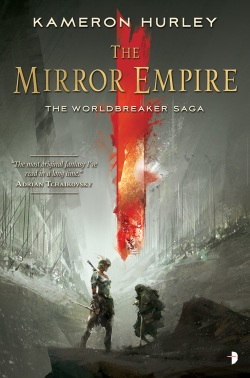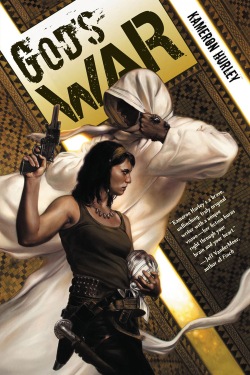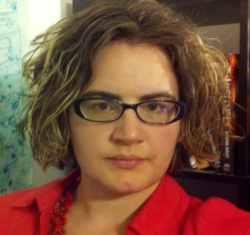For today’s guest post, I’m proud to welcome Kameron Hurley, whose new epic fantasy novel The Mirror Empire is (deservedly) making all kinds of waves.
Aside from The Mirror Empire, she is also the author of the award- winning God’s War Trilogy, comprising the books God’s War, Infidel, and Rapture. She has won the Hugo Award, Kitschy Award, and Sydney J. Bounds Award for Best Newcomer. Hurley has also been a finalist for the Arthur C. Clarke Award, Nebula Award, the Locus Award, BFS Award, and the BSFA Award for Best Novel. Her short fiction has appeared in Lightspeed Magazine, Year’s Best SF, EscapePod, The Lowest Heaven, and the upcoming Mammoth Book of SF Stories by Women.
Please enjoy this thought-provoking guest post from one of today’s most talented and hard-working authors.
Why I Stopped Writing About White People by Kameron Hurley
Now there’s a click-bait headline for you, eh?
I’ve written before about growing up in a small white rural town. One that was deliberately constructed that way, as were many neighborhoods in the United States. A legacy of slavery, racism, oppression, and terror kept those of different races segregated -“separate but equal” – long after race-based slavery was no longer the letter of the law.
What that means is that I inherited a broken system built on a brutally fettered past from the moment I was born, and I’ve been working my whole life to uncover what the real world actually looks like. It’s in the best interests of people in power that I don’t know. That I turn on the television and see only other white people like me. That my neighbors are all white. That most of the people at the grocery store are white. That the stories I read are populated with white people. It’s vital that I believe this view of the world because it makes it far easier to dehumanize people who aren’t like me. To turn around and say someone else is other.
 But what those folks didn’t consider is that I was also born a woman, and I learned the hard way that even though everyone said I was equal, and that I had the same opportunities, and that I was treated the same, and that the world was built for me, it was all a lie. I learned that the real world wasn’t going to treat me like it did the white male heroes on tv, however much I aspired to be like them. It was going to treat me like a woman, however much I learned to despise all the trappings of femininity from a deeply biased media that said women were emotional, weak, conceited; good only so long as they were wives who picked up after irresponsible husbands or whores with hearts of gold.
But what those folks didn’t consider is that I was also born a woman, and I learned the hard way that even though everyone said I was equal, and that I had the same opportunities, and that I was treated the same, and that the world was built for me, it was all a lie. I learned that the real world wasn’t going to treat me like it did the white male heroes on tv, however much I aspired to be like them. It was going to treat me like a woman, however much I learned to despise all the trappings of femininity from a deeply biased media that said women were emotional, weak, conceited; good only so long as they were wives who picked up after irresponsible husbands or whores with hearts of gold.
The lie I learned about what stories and media taught me about my place in the world also led me to interrogate what I’d been told about race, too. I heard “we’re all equal now” and “You can be whoever you want” but the reality was that none of us could outrun history. We all started where we were because of the systems that came before us. And we were continually reminded of our place in thehierarchy of things by stories, by media, by laws that will believe a man over a woman, and a white person over a black one.
I made the decision to stop writing stories full of white people after I went to the Clarion West writing workshop when I was twenty. I had started to do some traveling by that point, and was slowly waking up to the fact that writing stories full of white people in the past, the future, in secondary worlds, was not being “realistic” like everyone said it was. It was constructing a narrative. It was pretending that the carefully constructed world I saw all around me in my little white town was going to go on and on into the future, and the only people with stories worth telling would be people like me living in those towns.
 Traveling went a long way toward giving me a better picture of the real world. It taught me that realism, or being “realistic” has nothing to do with the real world at all, but our collective perception of what is real. By writing stories purely populated with the same pale heroes with the same pale ideals, I was not being “realistic” but contributing to a mass delusion.
Traveling went a long way toward giving me a better picture of the real world. It taught me that realism, or being “realistic” has nothing to do with the real world at all, but our collective perception of what is real. By writing stories purely populated with the same pale heroes with the same pale ideals, I was not being “realistic” but contributing to a mass delusion.
There was no better way, for me, to have this mass delusion hit me square in the face than living for a year and a half in Durban, South Africa. It was a country whose population was rigidly codified by race right up until 1990. It was so rigidly codified that even though just 20% of the country’s population is white, I had one proud young white handyman confide that before the dismantling of Apartheid one could walk around Durban and see “fewer than one black per ten whites.”
The reality of the actual country, and who lived there, was brutally and systematically shielded from people’s view. Just as was done in the United States. It was the same system, only easier to see, because it was not the one I was born into.
The more I saw of the actual world, the more I realized how broken my conception of it was. The future will be full of people who inhabit the world now, and the past is full of the people who inhabit the world now. To create stories that pretend it’s not is to feed into the same system of oppression and erasure that brought us to this place.
And I decided I wasn’t going to be one of those people anymore.
So my futures, and my fantasy novels, got more colorful. More interesting. More diverse. Just like real life. Like the real world.
There will always be people calling my decision political, of course, without asking themselves about the political decision made by those who have written in unrealistically white worlds their whole lives. What could be more political than a legal, political, and social system that seeks to erase the majority of the world’s population and pretend a minority population – white people make up just 20% of the world’s population – owned the past, and will own the future?
The reality is that we are building the stories of ourselves. And stories, my stories, are for all of us.
Kameron Hurley’s latest novel The Mirror Empire is out now from Angry Robot. For more of Kameron’s non-fiction, check out her essay collection We Have Always Fought: Essays on Writing, Craft and Fandom.




Come visit Houston
Such a clickbait title, Kameron. 🙂
And every decision is political. It gets labeled political primarily by people who don’t like it.
Thanks for posting this, Stefan. I’m a huge Hurley fan and love watching her undermine The Patriarchy. It gives me hope for my daughter.
Pingback: MIRROR EMPIRE Blog Tour is Upon Us: Here’s What to Expect | Kameron Hurley
I love your essays, Kameron. I hope to try your fiction soon. I bought Mirror Empire ebook first week it was released but I’m wrapping up a Word War I non-fiction reading list presently. You are an inspiration.
Reblogged this on Misty Midwest Mossiness and commented:
I can relate to Kameron because I too grew up in a small rural town. I appreciate her efforts of breaking the writing mold and challenging us to be more inclusive.
Pingback: There Can Be Only Linkspam (19 September 2014) | Geek Feminism Blog
I’ve been a total scifi geek since I was 8 and always used to ask my Mom ,” How come there ain’t no Black People in the future?” , when we watched my favorite shows together. She always gave me a different answer, but most times she would say “Maybe we left.”
Some people go through their entire life and never ask such questions. Thank you for being one of those who did, and came up with an answer too! (Maybe we didn’t.)
Pingback: Some What It’s Like to Be a Woman Links | Feminist Philosophers